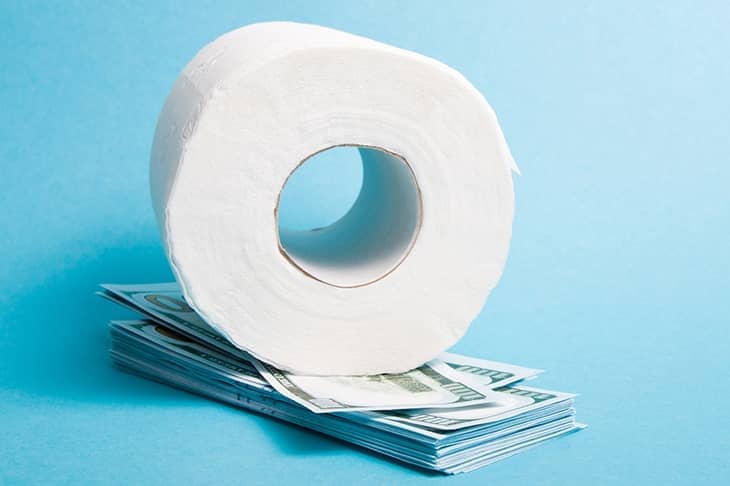If there’s anyone in Britain who knows how to keep grocery shelves stacked, it’s former Tesco chief executive Sir Dave Lewis, who has been named as Downing Street’s ‘supply chain tsar’. Application of Tesco’s mastery of logistics and fierce discipline on suppliers should keep delivery trucks moving, so long as they have drivers. But even Lewis won’t be able to avert the pre-Christmas surge of panic-buying which I’m told Cabinet Office planners fear — especially if it’s combined with a major outage in the banking system.
Last week’s Facebook crash was a warning that blank screens are only a couple of burned-out circuits or a cyberhacker’s half-hour away. And if we’re looking for vulnerabilities, consider the contactless card transactions that now account for more than a quarter of all UK payments and for which the limit goes up this week from £45 to £100: what happens if the systems behind the card terminals go down, shortly followed by ATM networks overwhelmed by demand for cash? It may be comforting to know that the Bank of England (working with the Treasury and the National Cyber Security Centre, among other bodies) has recently updated its ‘operation resilience’ guidelines for just such an eventuality. Or maybe that just tells us how real and imminent the authorities believe the risk to be.
Either way, it would be wise to stash an emergency wad down the sofa — and to study how Ireland coped with a long bank strike in 1970. When cash dried up, cheques and IOUs became the only available currency; and when chequebooks were exhausted, people made their own, according to one account, ‘on the backs of cigarette boxes and even on toilet paper’. Another reason, besides fear itself, to start hoarding loo rolls.
Strange bedfellows
My man in the hospitality suite at St James’ Park says there’s genuine rejoicing at the £305 million takeover of Newcastle United by Saudi Arabia’s Public Investment Fund — chaired by de facto ruler Mohammed bin Salman — in partnership with Amanda Staveley and the Reuben family. Much as I enjoy trying to defend the departing owner Mike Ashley as a misunderstood hero of capitalism, there’s no denying fans are delighted to be rid of him. Meanwhile, city leaders’ concern for human rights in the desert kingdom will be swiftly assuaged by largesse towards the club’s charitable foundation, which supports women’s teams and mental health causes. And frankly, among the Premier League’s gallery of monstrous owners, one more brute in search of ‘sportswashing’ is neither here nor there.
But how curious that the billionaire Reuben brothers — Mumbai-born Sephardic Jews — should ally themselves with a regime that has only recently expunged extreme anti-Semitic material from its school textbooks. Already owners of Newcastle’s racecourse, dog track and Monument shopping mall, the Reubens could have bought the whole football club from petty cash, but evidently prefer the lower profile of a minority stake. And having made a first fortune trading aluminium with Russian oligarchs, they know how to do business with unpleasant partners. Kudos is due to femme-fatale financier Staveley — more used, like Ashley, to media scorn — for harnessing strange bedfellows, playing an 18-month poker game with their money, and closing an improbable deal.
Retiring gladiators
Farewell to Henry Kravis and his cousin George Roberts, founders of the pioneering Wall Street private equity firm KKR, who are retiring after 45 years at the helm of an operation that helped create the gladiatorial games of the modern takeover arena. They also perfected the technique of the debt-laden ‘leveraged buyout’ and spawned many imitators on both sides of the Atlantic. Whether corporate raiders in the KKR mode have done good for capitalism by forcing weak companies to perform better or done evil by ripping the heart out of reputable businesses and decimating their workforces is a moot point. But one thing Kravis and Roberts certainly achieved was to make complex dealmaking sexy enough to provide material for a bestseller.
Barbarians at the Gate, Bryan Burrough and John Helyar’s account of KKR’s hard-fought 1988 buyout of the food conglomerate RJR Nabisco, is one of two books published at the end of the 1980s — the other being Michael Lewis’s Liar’s Poker, about life
on Salomon Brothers’ trading floor — that fixed for ever the popular image of swaggering financial machismo of that decade.
Yet arguably what came after was much worse: Jordan Belfort’s 2007 memoir The Wolf of Wall Street (turned into Martin Scorsese’s 2013 film) makes Kravis and Roberts — and Lewis’s anti-heroes John Gutfreund and Lew Ranieri — look like knights in shining armour by comparison.
Look on the bright side
Another day, another hospitality suite: this time at Old Trafford, where I’m talking to a business audience about the outlook for entrepreneurs. The sunlit cricket pitch looks perfect, reminding me that when I watched a Test match here as a boy — England vs Australia, 1964 — Barrington and Dexter batted endlessly and I felt sick. Today’s visit is much more enjoyable and the best question lobbed at me is: ‘You’re gloomy about inflation and government competence, Martin, but if you’d been told in mid-March 2020 that the price of getting out of Covid would be the economic conditions we have right now, you’d have taken it, wouldn’t you?’
Back then, before the furlough scheme, long before the vaccine roll-out, I feared mass unemployment, bankruptcies, nationalisations, social unrest and a return to a wartime command economy with rationing. What we’ve got instead is a rapid but patchy recovery marred by random shortages and sharply rising prices. So yes, seen in that perspective, we’re damned lucky.







Comments